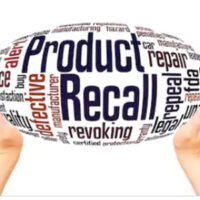How Do Food Product Recalls Work?

With so many dangerous products out there, and so many being recalled so often, you would think that there should be one government agency in charge of handling recalls, or to evaluate whether a product should be recalled or not. That would make sense. Unfortunately, that’s not how the system works.
There’s no one agency that handles recalls for every product. There are really four government agencies with the authority to issue product recalls, and they each handle different types of products.
Food and Edible Product Recalls
When it comes to food and edible products, the Food and Drug Administration (FDA) has the authority to investigate defective products and issue recalls, if necessary. The FDA handles recalls for almost every food product, as well as drugs and medicines (but not over the counter supplements).
The FDA even handles non-medicinal medical products such as medical devices.
The FDA, however, does not handle meat, chicken, pork, eggs, or generally any kind of meat that comes from a farm. There, the USDA (Department of Agriculture) has authority to issue product recalls.
That leads to an odd situation—if a product has both meat and non-meat—think of a pre-packaged salad—the USDA would have authority to recall the meat, with the FDA having authority to issue recalls for the vegetables or croutons or whatever else.
To make things more confusing, neither the FDA nor the USDA handles beer or liquor recalls–that falls to the Bureau of Alcohol Tobacco and Firearms.
Different Kinds of Food Recalls
Food recalls happen when food is contaminated, and you’ve probably heard about contaminated food being recalled in the news. But food can also be recalled if there is a packaging error, or if the information on the package is misleading.
Food recalls are classified by severity, from a Class 1 recall, which is for items that will almost certainly harm or kill you, to Class 3 recalls, which means eating the food is dangerous (or the packaging is false), but there is a low likelihood of harm or death.
As you can imagine, sometimes people get sick, but we don’t know from what. Even if everybody ate the same product, that product can have many ingredients, and the FDA or USDA may not be able to pin down which ingredient or product is causing the problem. When that happens the government will issue a warning, and not a recall.
No Real Power
Despite all of this, in the end, the government has no power to force a company to take a product off the shelves, or fix a product. It is up to the company to do it voluntarily. Most will, for fear of being sued for product liability, and most retailers, who can be sued for defective food that they sell, will pull the item from shelves in an abundance of caution.
Call the Knoxville personal injury attorneys at Fox Willis Burnette, PLLC, for help if you are injured by any kind of defective drug or food product.
Resource:
consumerist.com/2015/06/08/how-recalls-work-and-dont-and-why-theyre-all-so-different/











